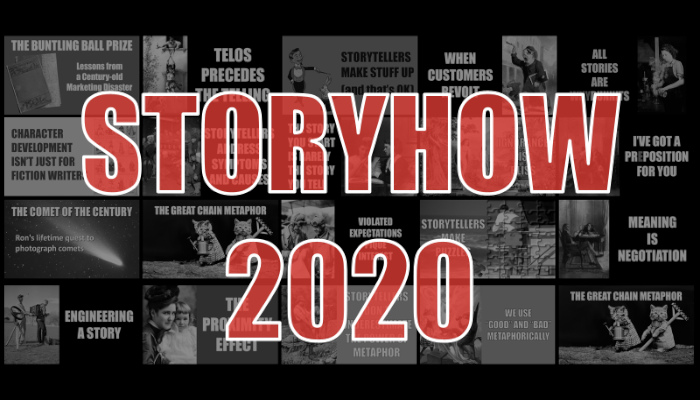
While it will be good to see 2020 in our rear view mirror, we still managed to accomplish a lot here at the StoryHow Institute. In addition to publishing 20 articles, we also released our newest product: The Proverb Construction KitTM.
Here’s a recap of the StoryHow blog in 2020:
People find themselves in trouble when they violate the metaphors of others.
What happens when customers refuse to wait for you to step through the self-aggrandizing opening to your marketing presentations?
Ron explains how his roots in engineering have served his storytelling well.
4. Interest Piques When Our Expectations are Violated
Have you ever stopped in the middle of a discussion and said, “That’s an interesting question?” In this article, Ron addresses what makes things interesting.
Ron discusses the role of the Greek word telos in human communications.
6. Looking to Share a Big Idea? I’ve Got a Preposition for You
Ron explains how the smallest, most commonly used words in the English language are more effective in conveying universal meaning than their larger, multisyllabic cousins.
7. The Sound Designer and the Storyteller
What does a sound designer and a storyteller do with a borrowed drone? Ron takes you behind the scenes of a family storytelling project.
8. Storytellers Address Symptoms and Causes
When solving a problem, it’s too easy to focus myopically on eliminating the symptoms as opposed to the cause.
9. The Story You Start is Rarely the Story You Tell
The best stories begin by telling a different one.
10. Character Development isn’t just for Fiction Writers
Inspiration comes from many places. Who are some of the most influential people in your life? Perhaps they represent the beginnings of some incredible new characters in your next story?
11. Storytellers Make Stuff Up (and that’s OK)
Sometimes storytellers need to invent things–to make a point, rather than to deceive.
12. The Buntling Ball Prize: Lessons from a Century-old Marketing Disaster
Sometimes we stumble onto one story while researching another. A few years ago, an advertisement caught my Ron’s eye while he researched a story an in an 1870s magazine. He filed it away, forgot about it, then came across it again a couple of months ago. Today we’re going back 135 years to tell the story of two books: a best seller and an epic flop.
13. Storytellers Don’t Underestimate the Power of Metaphor
Metaphor is both misunderstood and under-appreciated. And while most people have an elementary understanding of it–the act of describing one thing in terms of something totally different–they stop there, using it as a clever writing trick as opposed to recognizing the fundamental role that it plays in human thought, understanding, and communications. Ron opens the first of a multi-part series on the importance of studying metaphors.
14. We Use “Good” and “Bad” Metaphorically
In the second post of this series on metaphor, Ron explains how we attach the concept of good and bad to the properties we us to convey new meaning.
In the third of our series on metaphor, Ron describes how storytellers create puzzles that their audiences feel compelled to solve.
This fourth post in a series on metaphor looks at the reasons why metaphoric property transfers are unidirectional.
Writing a story for audio is different than one intended for text. Here’s story told each way. Ron presents a personal story through both his 15-year-old podcast (Griddlecakes Radio ®) and a blog post with photographs.
The fifth post in our series on metaphor reveals fundamental truths about the human condition, and thus are effective devices to explain complex concepts. We do so by taking a deep dive into the metaphor: Proximity is Power.
The sixth post in our series on metaphor takes a look at the power of combining seemingly incongruous terms to convey the deepest of meaning.
20. All Stories are WhyDunnits
The best storytellers draw their audiences in by presenting characters that act in ways that seem incongruous with achieving the best outcomes.